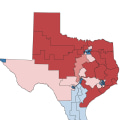As the 2020 election season heats up, immigration policies have become a hot topic for candidates in Southeast Texas. With a diverse population and a border with Mexico, this region has a unique perspective on immigration and its impact on the community. From local races to national campaigns, candidates are addressing this issue in various ways.
The Importance of Immigration Policies in Southeast Texas
Southeast Texas is home to a large immigrant population, with many coming from Mexico and Central America. This region also has a significant number of undocumented immigrants, estimated to be around 1.6 million in Texas alone.As such, immigration policies have a direct impact on the lives of many individuals and families in this area. Furthermore, the economy of Southeast Texas is heavily reliant on industries such as agriculture, construction, and hospitality, which often employ immigrant workers. This adds another layer to the discussion of immigration policies as it directly affects the labor force and economy of the region.
The Stances of Candidates in Southeast Texas
When it comes to addressing immigration policies during their campaigns, candidates in Southeast Texas have varying stances. Some take a hardline approach, advocating for stricter border control and harsher penalties for undocumented immigrants. Others have a more compassionate view, emphasizing the need for comprehensive immigration reform and a path to citizenship for those already living in the country. For example, in the race for Texas's 23rd Congressional District, incumbent Republican Will Hurd has been vocal about his support for border security and his opposition to sanctuary cities.On the other hand, his Democratic opponent Gina Ortiz Jones has highlighted her own immigrant background and has called for a more humane approach to immigration policies. In local races, the stances of candidates may vary even within the same party. In the race for mayor of Houston, both Democratic candidates Sylvester Turner and Tony Buzbee have expressed support for protecting the rights of immigrants, but they differ on how to achieve this. Turner has emphasized the importance of working with federal authorities, while Buzbee has proposed creating a municipal ID program for undocumented immigrants.
The Impact of National Politics
While immigration policies are a significant issue in Southeast Texas, the national political climate also plays a role in how candidates address this topic. With President Trump's hardline stance on immigration and his push for a border wall, many Republican candidates in this region have aligned themselves with his policies. On the other hand, Democratic candidates have been critical of the Trump administration's approach to immigration and have proposed more progressive solutions.For example, in the race for Texas's 7th Congressional District, Democratic candidate Lizzie Fletcher has called for comprehensive immigration reform and has criticized her opponent, incumbent Republican John Culberson, for his support of Trump's border wall.
The Role of Local Organizations
In addition to the stances of individual candidates, local organizations also play a significant role in shaping the conversation around immigration policies in Southeast Texas. Groups such as FIEL Houston and the Texas Organizing Project have been advocating for immigrant rights and pushing for policies that protect and support this community. These organizations often hold candidate forums and town halls where they invite candidates to discuss their views on immigration policies. This allows voters to hear directly from the candidates and make informed decisions at the polls.The Importance of Voter Engagement
Ultimately, it is up to voters in Southeast Texas to hold their elected officials accountable for their stances on immigration policies. With a diverse population and a significant number of eligible voters, this region has the power to influence the outcome of elections and shape the policies that affect their community. It is crucial for voters to educate themselves on the stances of candidates and their proposed solutions for immigration policies.They should also consider the impact of national politics and the role of local organizations in shaping these policies.






